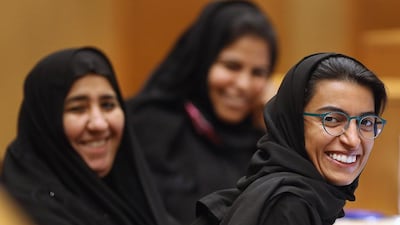ABU DHABI // Sheikha Fatima bint Mubarak has used a rare interview to salute more than four decades of women’s empowerment and call for an even greater female role in the UAE’s progress.
“My ambitions for the achievement of more gains for women in all fields are without limits,” Sheikha Fatima said.
“Emirati women should become a real active partner, and not just a participant, in the completion of the programmes and plans for sustainable development and the achievement of progress and prosperity for the nation.”
In the interview with Nation Shield, the monthly journal of the Armed Forces, the Mother of the Nation and widow of the founding President, Sheikh Zayed, shares her views on the role of women, describes the struggles they faced in the country's early days and addresses the challenges ahead.
Sheikha Fatima speaks at length of how her late husband laid the foundations for women’s empowerment, the efforts made in the 1970s to boost women’s rights and the journey towards playing a leading role in society.
“At the beginning of this long march of painstaking and diligent work, we faced many difficulties and hardships,” she said.
Sheikh Zayed “encouraged and supported me without limits for the advancement of women, encouraged them to learn, and directed structures and organisations to be established that deal with women’s issues and rights”.
In 1975 Sheikha Fatima helped to establish the General Women’s Union, which she chairs and which works to promote the rights of women in all areas including work, education, health care, social security, ownership and equality in rights and duties with men.
“Women’s activities began in the early seventies with only four ladies,” Sheikha Fatima recalled, and this small group created the first women’s gathering under the name of the Abu Dhabi Women Development Association in 1973.
This led to the creation of the GWU.
“The establishment of the women’s union with the unlimited support of Sheikh Zayed constituted one of the pillars of the federation, as well as a major turning point in the march of progress for women,” she said.
Sheikha Fatima said another step for the progress of women came in 1997, when she announced that women should participate in the political system.
However, it wasn’t until 2005 that women were allowed to take part as candidates and voters in the FNC.
Along with joining the FNC, women are also a part of the Council of Ministers, with four women occupying Cabinet seats today. There are also female ambassadors in Spain, Sweden and Montenegro.
“Now women have become ministers, members of the FNC, engineers, physicians, diplomats, lawyers, judges, prosecutors, professors, lecturers, officers, pilots in air defence, investors, businesswomen and other positions in which they have proved their capacity and efficiency in work and creativity, side by side with their male counterparts,” Sheikha Fatima said.
Women occupy two thirds of Government jobs, a third of them in positions of leadership and decision-making. A further 15 per cent of women are in technical and academic posts such as medicine, teaching and nursing, and nine of the FNC’s 40 members are women.
“This is also one of the highest percentages in terms of women’s representation in parliamentary institutions,” Sheikha Fatima said.
Education, she said, had initially been a major challenge. “There were no schools for girls in the UAE before the establishment of the union.”
The sector has blossomed since the formation of the UAE and has “witnessed successive leaps”.
“The number of females in the general education schools and universities is high and the percentage of girls in university education is one of the highest in the world.”
Sheikha Fatima also noted the UAE’s efforts in ensuring women receive equal rights.
“The UAE was quick to respond to the Universal Declaration on the Elimination of Violence Against Women and Child Abuse and has taken a number of decisions, decisive measures and preventive solutions to prevent violence against children and women.”
The declaration was created in 1993 and adopted by the United Nations for the universal application of women’s rights and focuses on domestic violence.
“Notably, there is the establishment of departments of social protection in the concerned ministries, sections for family guidance in courts, and shelters for victims of human trafficking.”
Among her notable work for women, Sheikha Fatima also chairs the Supreme Council for Motherhood and Childhood established in 2001 and the Family Development Foundation established in 2006.
newsdesk@thenational.ae

